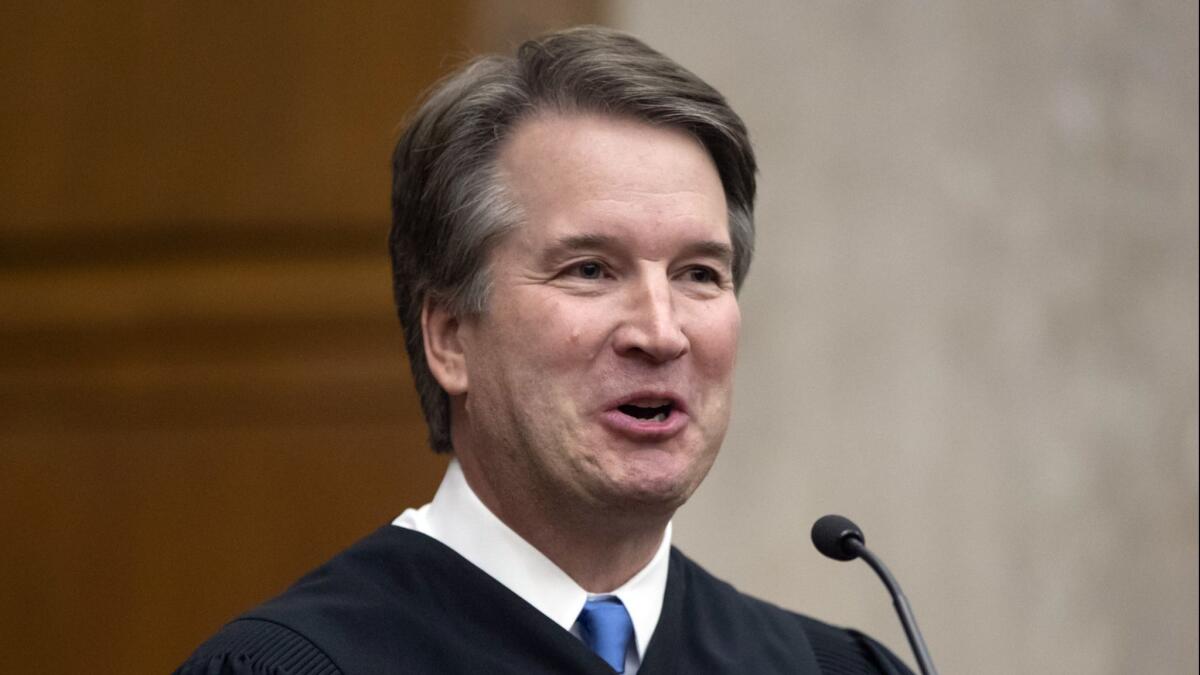Editorial: The Kavanaugh hearings don’t have to be an exercise in futility

On Tuesday the Senate Judiciary Committee begins confirmation hearings on the nomination of Judge Brett Kavanaugh, President Trump’s second nominee to the Supreme Court. Too often such hearings are empty exercises — the nominees are coached to avoid saying anything controversial, and most senators are more interested in speechifying than in posing substantive questions.
These hearings in particular may shed more heat than light because of the poisonous partisanship that continues to infect the confirmation process. If the hearings for Trump’s first nominee, Neil M. Gorsuch, are any guide, Democrats will be content to harangue Kavanaugh and Republicans to cheerlead for him.
At the risk of being accused of naivete, we would urge committee members from both parties to ask Kavanaugh questions designed not to embarrass or elevate him but to elicit his views about the Constitution, the role of the court and the importance of precedent. Here are several areas that could be especially fruitful to explore:
* Abortion rights
In a speech last year, Kavanaugh praised the late Chief Justice William H. Rehnquist, who dissented in Roe vs. Wade, for “stemming the general tide of free-wheeling judicial creation of unenumerated rights that were not rooted in the nation’s history and tradition.” Did Kavanaugh agree with Rehnquist’s dissent, even if, as he reportedly told Sen. Susan Collins (R-Maine), he regards Roe as “settled law”? And what does he mean by “settled law”?
Enter the Fray: First takes on the news of the minute from L.A. Times Opinion »
Kavanaugh, a judge on the U.S. Court of Appeals for the District of Columbia Circuit, also should be asked about his position — overruled on appeal to the full appeals court — that the Trump administration could prevent a teenage girl who was in the country illegally from obtaining an abortion until the government found a sponsor for her.
* Gun control
In 2011, Kavanaugh dissented from a decision upholding a D.C. ordinance banning the possession of semiautomatic rifles. When the high court refused earlier this year to hear a challenge to California’s 10-day waiting period for the purchase of a firearm, Justice Clarence Thomas complained in a dissent that “the 2nd Amendment is a disfavored right in this court.” Senators should ask Kavanaugh if he agrees with Thomas.
* Executive power
Kavanaugh has said that Congress should enact a law to spare sitting presidents from what he calls the distraction of having to respond to civil lawsuits, and that it might consider a statute “exempting a president — while in office — from criminal prosecution and investigation.”
It’s unlikely that he would answer a question about whether a president must respond to a subpoena — an issue that could come before him if special counsel Roberts S. Mueller III were to demand testimony from Trump. But senators should ask him what he thinks of a 1974 decision in which the Supreme Court ruled that President Nixon had to comply with a subpoena for his White House tape recordings. During a panel discussion in 1999, Kavanaugh reportedly questioned whether that decision was wrongly decided. (Kavanaugh seemed to take a more favorable view of that landmark decision in a 2016 article.)
* Terrorism and civil liberties
In Boumediene vs. Bush, the Supreme Court held in 2008 that suspected terrorists confined at Guantanamo Bay had the constitutional right to seek their release by seeking writs of habeas corpus. Yet Kavanaugh has joined in rulings on the D.C. Circuit that have taken a distressingly cramped view of that decision. He should be asked about what limits the Constitution places on indefinite detention.
* The role of regulatory agencies
How much leeway should the courts give federal agencies to interpret statutes? That issue has vast implications for the enforcement of safety and environmental laws. Kavanaugh has raised questions about how courts decide whether a statute is so ambiguous that it should defer to an agency’s interpretation of it. And in a dissent last year, he opined that the Federal Communications Commission exceeded its authority when it adopted net neutrality rules in 2015.
These topics don’t exhaust the issues that senators could ask Kavanaugh; he also could profitably be questioned about his views of the separation of church and state, free speech and constitutional standards for capital punishment. But if such questions are to be asked and answered, members of the committee will have to forgo polemics, preening and point-scoring.
Follow the Opinion section on Twitter @latimesopinionand Facebook
More to Read
A cure for the common opinion
Get thought-provoking perspectives with our weekly newsletter.
You may occasionally receive promotional content from the Los Angeles Times.










